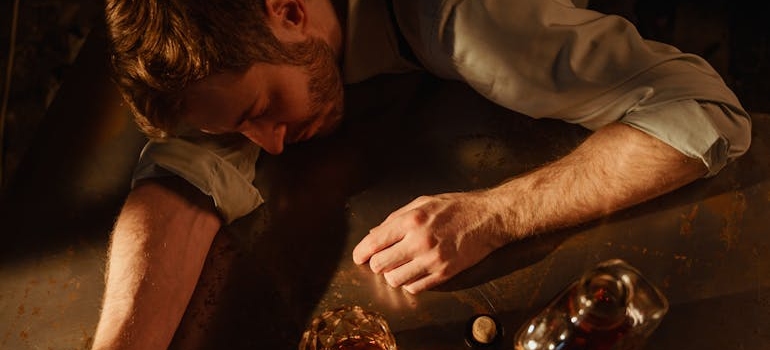Caring for a loved one who is struggling with alcoholism can feel overwhelming. You want to help, but it’s hard to know how to cope with an alcoholic without losing yourself in the process. Setting boundaries, offering support, and protecting your own well-being are key to managing this delicate situation. It’s important to balance care and space for both your emotional health and theirs. There are many options available, from rehab programs to therapy and holistic treatments, that can make a difference. If you’re unsure where to start, exploring drug and alcohol rehab in West Virginia might be a good place. You don’t have to handle this alone. We’ll walk you through practical steps to help both you and your loved one through this challenging journey.
Alcoholism: What You Need to Know
Alcoholism is more than just drinking too much. It’s a disease that affects both the person and those around them. You might see changes in their behavior, mood swings, or secretive actions. Understanding these signs helps you know how to cope with an alcoholic. Addiction alters the brain, making it hard to control drinking.

It’s not a choice, but it still impacts your life deeply. Recognizing that your loved one needs help is the first step. You can support them by encouraging treatment and setting healthy boundaries. Knowing the facts about alcoholism makes it easier to handle the challenges and find the right ways to help. You’re not alone in learning how to cope with an alcoholic.
Myths and Misconceptions About Alcoholism
Many people believe things about alcoholism that aren’t true. You might think someone can stop drinking anytime they want. This isn’t the case. Alcoholism changes how the brain works, making it hard to quit. Another myth is that only certain types of people become alcoholics. Anyone can struggle with addiction, regardless of background.
Some think that drinking too much isn’t a big deal. But it deeply affects relationships, health, and everyday life. When you ask how do you deal with an alcoholic family member, it’s important to know these facts. Recognizing the truth helps you support your loved one better. Exploring alcohol rehab centers in WV can provide the right help. Don’t let myths stop you from finding the support you need.
The Signs You Might Be Missing
Spotting hidden signs of alcoholism can help you decide how do I help an alcoholic family member. Recognizing these signs is crucial. Exploring substance abuse treatment WV can provide the help needed. Understanding these signs makes it easier to support your loved one and take the right steps to cope with an alcoholic effectively. Look out for these indicators:
- Frequent drinking: They drink more often and may hide it.
- Mood swings: Sudden anger, sadness, or irritability.
- Neglecting responsibilities: Ignoring work, school, or family duties.
- Physical changes: Noticeable weight loss, bloodshot eyes, or shaky hands.
- Secretive behavior: Hiding bottles, lying about drinking.
- Social withdrawal: Avoiding friends and activities they once enjoyed.
- Health issues: Frequent sickness, accidents, or injuries.
- Financial problems: Unexplained expenses or borrowing money.
- Loss of interest: Losing passion for hobbies and interests.

Building and Maintaining Healthy Boundaries
Setting boundaries is key when you’re figuring out how to cope with an alcoholic. It helps protect your own well-being while supporting your loved one. Start by deciding what behaviors you will not accept, such as drinking around you or lying about it. Clearly communicate these limits with kindness but firmness. Stick to your boundaries even when it’s tough, as consistency shows you are serious.
Don’t feel guilty for putting yourself first—your health matters too. It’s okay to say no to things that drain you or enable the addiction. Healthy boundaries create a safe space for both you and your loved one to grow. By maintaining these limits, you show respect for yourself and encourage your loved one to seek the help they need.
Navigating Conversations About Alcoholism
Talking about alcoholism with your loved one can be challenging. Here are some tips to help you through:
- Choose the right time: Find a calm moment when you both are relaxed.
- Stay calm: Keep your emotions steady and avoid getting angry.
- Use “I” statements: Share how their drinking affects you without blaming them.
- Be clear and direct: Clearly express your concerns without beating around the bush.
- Listen actively: Let them speak and show that you’re listening.
- Offer support: Let them know you want to help and are there for them.
- Set boundaries: Explain what you need to protect your own well-being.
These steps make conversations less confrontational and more supportive. Learning how to cope with an alcoholic starts with honest and compassionate dialogue. Be patient and give them time to understand and respond.
Supporting Without Losing Yourself
Helping a loved one with alcoholism is important, but so is your well-being. Learning how to cope with an alcoholic means finding a balance between support and self-care. Start by setting clear boundaries to protect your mental and emotional health. Don’t take on their problems or try to fix everything. It’s okay to say no and prioritize your needs. Seek support for yourself through friends, support groups, or counseling.
If alcohol abuse runs in your family, understanding your own triggers can help you stay strong. Take time for activities that make you happy and reduce stress. You can support your loved one without sacrificing your own happiness. By taking care of yourself, you’re better equipped to help them on their journey to recovery.

Understanding Enabling Behavior
Unfortunately, living with an alcoholic can be challenging. You might unknowingly enable their drinking. Knowing how to cope with an alcoholic means recognizing these behaviors. Here are some signs you might be enabling:
- Making Excuses: Covering up their drinking or lying to others.
- Taking Over Responsibilities: Handling their tasks to keep them from facing the consequences.
- Financing Alcohol: Giving them money that they use to buy drinks.
- Avoiding Confrontation: Not addressing their drinking to keep the peace.
- Minimizing the Problem: Saying their drinking isn’t serious or doesn’t affect you.
Stopping these actions is crucial. Enabling can prevent your loved one from seeking help. Focus on setting healthy boundaries and encouraging them to seek treatment. Understanding enabling behavior helps you take the right steps to support both yourself and your alcoholic loved one.
Exploring Treatment Options
There are always ways to find help for your loved one struggling with alcoholism. You don’t have to face this alone. We will be exploring various treatment options, including rehabilitation programs, therapy, and support groups. Understanding these choices can make a big difference in their recovery journey. Knowing how to cope with an alcoholic allows you to support both your loved one and yourself. Together, we can find the right path to navigate this challenging time and help your family move towards healing and hope.

Rehabilitation Programs
Rehabilitation programs can be a lifeline for your loved one. These programs provide the support they need to overcome alcoholism. Residential treatment facilities in WV offer a safe and structured environment where individuals can focus on their recovery. Inpatient rehab means staying at the facility full-time, giving them constant care and support.
Outpatient programs allow them to live at home while attending therapy sessions regularly. Both options include counseling, group therapy, and activities to build healthy habits. Rehab programs also teach coping skills to prevent relapse. Encouraging your loved one to join a rehab program shows you care and want the best for them. Explore residential treatment facilities in WV to find the right fit. Recovery is possible with the right help and support.
Therapy and Counseling
Therapy and counseling can make a big difference when learning how to cope with an alcoholic family member. Talking to a professional helps you understand your feelings and find healthy ways to handle the situation. Individual therapy for addiction focuses on your loved one’s personal struggles and helps them develop coping strategies.
Support groups connect you with others who are going through similar experiences, offering mutual support and advice. Seeking help through therapy provides tools to manage stress and set healthy boundaries. It also shows your loved one that you care and want them to recover. Don’t hesitate to reach out for counseling to support both you and your family during this challenging time.
Holistic Approaches
Holistic approaches can support recovery and complement traditional treatments. They focus on healing the mind, body, and spirit. Here are some options to consider:
- Mindfulness and meditation: These practices help reduce stress and manage cravings by promoting relaxation and self-awareness.
- Yoga and exercise: Regular physical activity boosts mood, improves health, and provides a positive outlet for energy.
- Nutrition counseling: A balanced diet supports physical health and helps the body recover from addiction.
- Art and music therapy: Creative activities allow the expression of emotions and can be therapeutic during healing.
- Acupuncture: This can relieve withdrawal symptoms and reduce anxiety, aiding in overall well-being.

What If They Refuse Help?
Sometimes, your loved one might not want to seek help. It’s tough, but you need to focus on how to cope with an alcoholic without forcing them. Stay calm and avoid arguments about their drinking. Show that you care by suggesting family therapy for addiction. Going with them to sessions can show your support and encourage them to open up.
Let them know you’re there when they’re ready to help. Keep setting boundaries to protect your own well-being. Accept that you can’t make them change, but you can control how you respond. Seek support for yourself through friends or support groups. Taking care of yourself is just as important as helping your loved one.
Prioritizing Self-Care and Emotional Well-Being
Taking care of yourself is crucial when you’re learning how to cope with an alcoholic. Here are some simple ways to prioritize your well-being:
- Set time for yourself: Make sure to have moments each day just for you, doing things you enjoy.
- Stay active: Exercise helps reduce stress and improve your mood.
- Eat well: A balanced diet keeps your body and mind strong.
- Get enough sleep: Rest is essential for your emotional health.
- Connect with others: Talk to friends or join a support group for understanding and encouragement.
- Seek professional help: A therapist can provide tools to manage your feelings and stress.
- Practice mindfulness: Techniques like meditation can help you stay calm and focused.

Knowing When to Walk Away
Sometimes, helping an alcoholic family member means knowing when to step back. It’s hard to watch someone you love struggle, but staying involved can sometimes do more harm than good. Ask yourself, how do you help an alcoholic family member without sacrificing your own well-being? If your efforts aren’t making a positive change, it might be time to set stronger boundaries.
Walking away doesn’t mean you stop caring; it means you protect yourself from further pain. Focus on your own health and happiness. Seek support from friends, support groups, or professionals to guide you through this decision. Remember, you can’t force someone to change. By knowing when to walk away, you create space for both you and your loved one to heal in your own ways.
Moving Forward Together
Facing a loved one’s alcoholism is tough, but you can find ways to cope and protect your own well-being. Remember to set clear boundaries and take care of yourself first. Reach out for support through groups or professionals who understand what you’re going through. Explore treatment options to help your loved one take the first step toward recovery. Keep communication open and stay patient, knowing that change takes time. You don’t have to handle this alone—there are resources and people ready to help you. By balancing care with boundaries, you can support your loved one while maintaining your own health and happiness. Take each day one step at a time and believe in your strength to manage how to cope with an alcoholic effectively.



